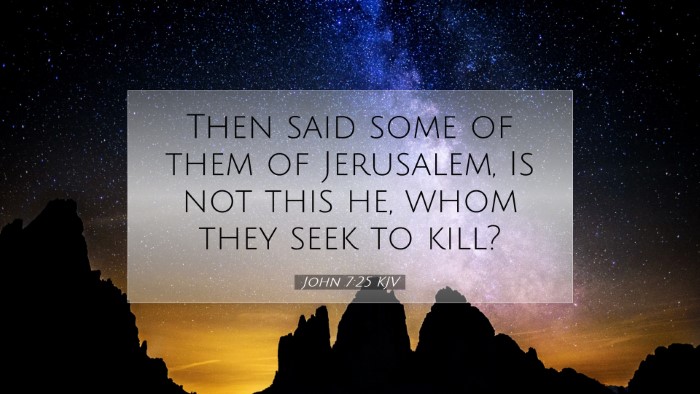Commentary on John 7:25
John 7:25 states: "Then said some of them of Jerusalem, Is not this he, whom they seek to kill?" This verse opens a significant discourse on Jesus’ identity and the intentions of the authorities towards Him. Various public domain commentaries provide rich insights that assist in understanding the theological and historical nuances of this passage.
Contextual Background
In the preceding verses, Jesus appeared at the Feast of Tabernacles in Jerusalem, a time of great religious significance and festivity. His teachings had begun to stir controversy as many recognized the conflicting opinions about His identity and mission.
Insight from Matthew Henry
Matthew Henry emphasizes the societal dynamics at play in John 7:25. He notes that the citizens of Jerusalem were aware of a plot against Jesus. Henry highlights the irony of the situation: while the Jewish leaders sought to eliminate Jesus, the populace questioned their motives and the legitimacy of their actions. This demonstrates a divide between the authorities and the common people, illustrating how Jesus had become a focal point of either faith or skepticism.
Observations from Henry's Commentary:
- Public Awareness: The people were informed about the plot against Jesus, indicating His significant influence and the rising tensions in Jerusalem.
- Skepticism towards Authority: There is a clear sense of suspicion regarding the motives of the Jewish leaders, as the public was grappling with varying opinions about Jesus.
- Faith vs. Fear: Many believed in Jesus despite the danger for doing so, showing a profound faith that contrasts with the fear exhibited by the religious leaders.
Reflection from Albert Barnes
Albert Barnes offers a historical-critical perspective, analyzing the motivations behind the inquiry from the residents of Jerusalem. He points out that their question reflects a broader curiosity about Jesus' messianic claims and the paradox of His position as both a wanted figure and a teacher of profound wisdom.
Insights From Barnes' Commentary:
- Recognition of Jesus: Barnes notes that the question indicates a recognition of Jesus' actions and identity among the populace. They were not indifferent; they were actively engaging with the controversy.
- Pursuit of Truth: The inquiry suggests that there was a desire for truth amid conflicting narratives surrounding Jesus' intentions and the leaders' accusations.
- Divine Timing: Barnes emphasizes the significance of divine timing as Jesus fulfills His mission despite the threats against Him, accentuating the sovereignty of God in the unfolding events.
Analysis from Adam Clarke
Adam Clarke, known for his meticulous exegesis, delves into the linguistic and cultural aspects of the verse. He highlights the use of the term "they seek to kill" as a representation of the grave tension in Jerusalem. Clarke's commentary provides a lens through which we can see the prophetic nature of the unfolding events, drawing parallels with Old Testament expectations of the Messiah.
Key Points from Clarke's Commentary:
- Prophetic Fulfillment: Clarke suggests that the prophecy concerning the rejection and persecution of the Messiah is visible in this scene, and underscores how Jesus embodies those prophecies.
- Cultural Context: The notion of "seeking to kill" reflects societal pressures and the lengths to which authorities will go to maintain control and suppress a perceived threat.
- Messianic Identity: Clarke argues that this inquiry illustrates a misunderstanding of Jesus’ purpose among the people, hinting at their hesitancy to fully embrace Him as the Messiah.
Theological Implications
John 7:25 serves as a pivotal moment for theological reflection on the identity of Jesus and the nature of belief amidst societal opposition. The comments by these scholars invite further contemplation on several key themes:
- Jesus as Division: This passage illustrates how Jesus serves as a point of division among the people, influencing belief systems and encouraging dialogue on faith.
- Authority vs. Individual Belief: The conflict between Jesus and the Jewish authorities raises critical theological concepts concerning the nature of religious authority and the personal conviction of faith.
- Faith in Danger: The willingness of individuals to believe in Jesus, despite the danger it posed, highlights the transformative power of faith in hostile environments.
Conclusion
In concluding our commentary on John 7:25, we see a rich interplay of faith, fear, authority, and identity rooted in Jesus' life and teachings. The insights provided by Matthew Henry, Albert Barnes, and Adam Clarke not only inform our understanding of this specific verse but also invite deeper reflection on the role of Jesus within the broader biblical narrative. Each commentary enriches our understanding of how Jesus was perceived in His time — a figure provoking both belief and animosity, challenging both social order and religious expectation.
As pastors, students, theologians, and scholars reflect on this passage, may we seek to apply these insights to our understanding of contemporary faith dynamics while remaining anchored in the truth of the Gospel.


